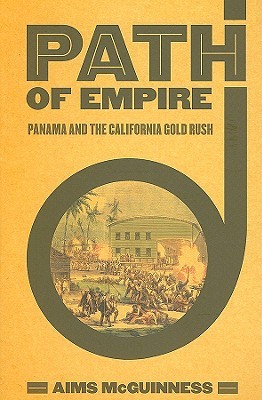| Path of Empire: Panama and the California Gold Rush Contributor(s): McGuinness, Aims (Author) |
|
 |
ISBN: 0801475384 ISBN-13: 9780801475382 Publisher: Cornell University Press OUR PRICE: $28.66 Product Type: Paperback - Other Formats Published: March 2009 |
| Additional Information |
| BISAC Categories: - History | United States - 19th Century - History | Latin America - Central America - Political Science | International Relations - General |
| Dewey: 327.730 |
| Series: United States in the World |
| Physical Information: 0.7" H x 6" W x 8.9" (0.80 lbs) 264 pages |
| Themes: - Chronological Period - 19th Century - Cultural Region - Latin America |
| Descriptions, Reviews, Etc. |
| Publisher Description: Most people in the United States have forgotten that tens of thousands of U.S. citizens migrated westward to California by way of Panama during the California Gold Rush. Decades before the completion of the Panama Canal in 1914, this slender spit of land abruptly became the linchpin of the fastest route between New York City and San Francisco--a route that combined travel by ship to the east coast of Panama, an overland crossing to Panama City, and a final voyage by ship to California. In Path of Empire, Aims McGuinness presents a novel understanding of the intertwined histories of the California Gold Rush, the course of U.S. empire, and anti-imperialist politics in Latin America. Between 1848 and 1856, Panama saw the building, by a U.S. company, of the first transcontinental railroad in world history, the final abolition of slavery, the establishment of universal manhood suffrage, the foundation of an autonomous Panamanian state, and the first of what would become a long list of military interventions by the United States.Using documents found in Panamanian, Colombian, and U.S. archives, McGuinness reveals how U.S. imperial projects in Panama were integral to developments in California and the larger process of U.S. continental expansion. Path of Empire offers a model for the new transnational history by unbinding the gold rush from the confines of U.S. history as traditionally told and narrating that event as the history of Panama, a small place of global importance in the mid-1800s. |
Contributor Bio(s): McGuinness, Aims: - Aims McGuinness is Associate Professor of History at the University of Wisconsin-Milwaukee. |